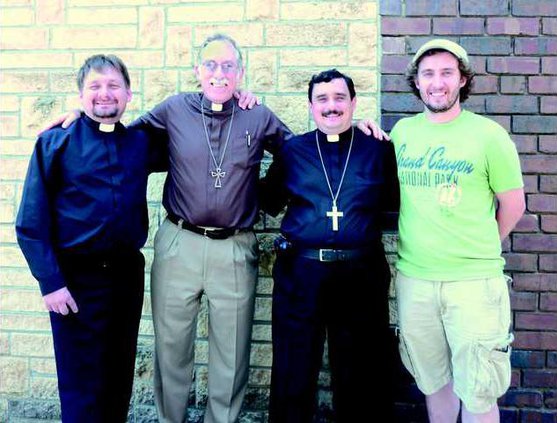A Lutheran minister and a lay pastor from Russia are visiting Kansas this month, and will speak Sunday at Trinity Lutheran Church in Great Bend.
The Rev. Alexander Lapochenko and Evgeny Slinchenko – who recently completed studies at seminary and serves as the congregation president – are from a partner church in Arsenyev, Russia. In 2009, four members of the Great Bend church visited Russia, and now Lapochenko and Slinchenko are returning the favor. They stopped by the Great Bend Tribune on Thursday with the Rev. Jim Strasen from Trinity Lutheran, and Petr Grigorev, owner of Petr’s Frame House, Great Bend, who translated.
Strasen said the Russian guests will show slides and talk about their homeland during Trinity Lutheran’s education hour, at 9:15 a.m. Sunday. A potluck dinner will follow the 10:30 a.m. worship service. The church is located at 2701 24th St.
Trinity Lutheran Church wasn’t the only church supporting the cash-strapped congregation in Russia, and now the Central States Synod of the Evangelical Lutheran Church in America is a sponsor. The guests attended the ECLA’s Central States Synod assembly in Kansas City, and visited St. Louis and Wichita. This past weekend they attended the Lutheran Church in Russell. They also visited St. Fidelis Catholic Church, the “Cathedral of the Plains” in Victoria, and toured an area feedlot.
Lapochenko said he became a pastor in 2005. Like many Christians, he is a convert from the Russian Orthodox Church.
Christianity was suppressed throughout most of the history of the Soviet Union, but in the late 1980s Mikhail Gorbachev introduced Glasnot, with new political and social freedoms. This resulted in many church buildings being returned, to be restored by local parishioners.
The Arsenyev church was founded in 1998 and meets in a remodeled house.
After the fall of the Soviet Union, the Russian Orthodox Church became the official religion of Russia. Others may exist, but can’t advertise, Strasen said.
“During the period of the Communists, religion was underground,” said Grigorev, who comes from the same region as the visiting pastors. (Arsenyev, with a population of 56,750, is 160 miles northeast of Vladivostok, which is located at the head of the Golden Horn Bay, not far from Russia’s borders with China and North Korea.) “You could have gotten executed or sent to concentration camps for your religious belief.”
Today, Lapochenko said, there is more religious freedom and protection from persecution, but church groups must report to the government.
“Because the Russian church is under the government, on one side it’s a great thing, because the destructive things against religion have been closed – the atheist groups have been closed. But, on the other hand, because it’s kind of controlled by the government, it’s not as free as it should be.
“It’s difficult right now,” he continued. “You have to go through a lot of paperwork to sustain a church.”
Strasen has fond memories of his 2009 trip to the partner church in Russia. “They were so warm and inviting,” he said.
The Russian guests have likewise appreciated the Midwestern hospitality they’ve received, Grigorev said.
Slinchenko said the Lutheran Church is growing in Russia. “People are coming,” he said. Some come out of curiosity, or to hear the excellent organ music at their church. “They are educating themselves.”
Russian pastors visit Great Bend





